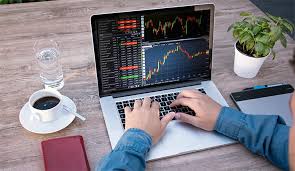Understanding Forex Trading Online Platforms 1838504157

Understanding Forex Trading Online Platforms
In the digital age, the financial landscape has changed dramatically, with Forex trading emerging as a popular avenue for investors. Online Forex trading platforms have made it easier than ever to participate in the global currency markets. These platforms provide traders with the necessary tools to analyze the market, execute trades, and manage their investment portfolios effectively. For those interested in exploring Forex trading, services such as forex trading online platform Morocco Brokers can provide essential guidance and support.
What is Forex Trading?
Forex, or foreign exchange, is the largest financial market in the world, with trading volumes exceeding $6 trillion daily. Unlike stock markets, Forex trading involves the exchange of currencies and operates 24 hours a day, five days a week. Traders buy one currency while simultaneously selling another, betting on changes in currency values. For example, if you believe the Euro will strengthen against the U.S. Dollar, you would buy Euros and sell Dollars.
The Importance of Online Trading Platforms
Online Forex trading platforms serve as the gateway for investors to the currency markets. They offer various tools and features that help traders analyze market trends and execute trades. Here’s why they are essential:
- User-Friendly Interface: Most platforms are designed with user experience in mind, making them accessible even for beginners.
- Real-Time Data: Access to real-time quotes and charts allows traders to make informed decisions.
- Order Management: Platforms enable traders to set take-profit and stop-loss orders, helping manage risk.
- Educational Resources: Many platforms offer tutorials, articles, and webinars to educate traders, which can be particularly beneficial for beginners.
Key Features of Forex Trading Platforms
When selecting a Forex trading platform, it’s crucial to consider various features that can enhance trading experience:
1. Trading Tools
Good trading platforms come equipped with comprehensive trading tools, including charting software, technical indicators, and market analysis resources. These tools help traders identify trends and patterns that inform their trading strategies.
2. Security
Given the risk involved in trading, security is paramount. Reliable platforms utilize encryption technology to protect user information and funds.
3. Multi-Device Compatibility
Today’s traders need flexibility; thus, leading platforms offer multi-device compatibility, enabling them to trade on computers, tablets, and smartphones.
4. Leverage Options

Forex trading involves leveraging your capital to maximize profits. Platforms that allow higher leverage can be more appealing, but it’s essential to understand that higher leverage also increases risk.
Types of Forex Trading Platforms
There are various types of Forex platforms available:
- Web-Based Platforms: Accessible through web browsers, these platforms require no downloads and are ideal for trading on the go.
- Desktop Platforms: These are comprehensive trading software applications that offer advanced tools and analytics for serious traders.
- Mobile Trading Apps: For traders who prefer to manage their portfolios on mobile devices, these apps offer convenience without sacrificing functionality.
Selecting the Right Forex Broker
Choosing the right broker is a critical step in successful Forex trading. Consider the following when making your selection:
- Regulatory Compliance: Ensure the broker operates under regulatory bodies that protect traders.
- Fees and Spreads: Study the fee structures, as high fees can eat into your profits.
- Customer Support: Reliable customer service is essential for resolving issues swiftly.
- Account Types: Check for availability of various account types that cater to different trading styles and experience levels.
Trading Strategies for Success
Successful Forex trading requires more than just a good platform; it is also about employing effective strategies. Here are some widely-used strategies:
1. Scalping
This short-term strategy involves making numerous small trades to exploit minor price movements, typically aiming to gain a few pips on each trade.
2. Day Trading
Day traders open and close positions within the same trading day, taking advantage of intraday price movements without holding overnight risks.
3. Swing Trading
Swing trading focuses on capturing medium-term price moves, often holding trades for several days to weeks.
4. Position Trading
This long-term strategy involves holding trades for extended periods, sometimes months or years, based on fundamental analysis.
Conclusion
Forex trading online platforms have revolutionized access to currency markets, making it feasible for anyone to trade from the comfort of their own home. While the appeal of profit exists, the risks are considerable. Therefore, education, analysis tools, and selecting the right broker and trading strategy are vital components of successful trading. By utilizing platforms optimally and honing your strategies, you can navigate the complexities of Forex trading more effectively and effectively move towards achieving your financial goals.
